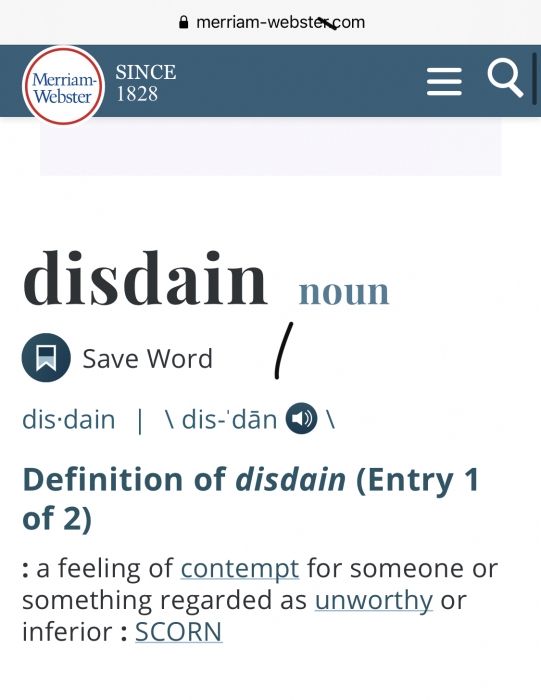Libertarianism. Is it more than just selfishness?
PVW said:
drummerboy said:
nohero said:
The Texas power grid is an example of the failures of Libertarianism.
Not the way the R's are talking about. They're already blaming the GND.
That would make more sense if the fossil fuel power plants had kept on working while wind and solar didn't. But, in fact, coal and natural gas plants have failed as badly or worse here.
This seems like more a classic story of underinvestment in public resources. It's not something unique to Texas, though the dominant conservative philosophy of disinclination to invest in public goods certainly didn't help at all.
and the problem with this philosophy is that it's easy for conservatives to sell it to everyone. Nobody is eager to pay taxes to fund any of these infrastructure projects.
A major obstacle is low public trust. Americans on the left like to hold up Nordic countries as examples we can learn from, given their high level of investment in public goods and infrastructure, but what's always struck me as most notable about these countries is less the specifics of their public policy and more the high levels of public trust that exists in these societies. Taxes are high there, but people largely accept that because they have relatively high levels of trust in their neighbors, and in the government as the extension of their neighbors.
How to build up that level of trust is a very hard question. Even in the Nordic countries that's been challenged lately. In the US we have a historically much lower baseline of trust. I think part of the appeal of something like libertarianism is that it tries to solve this by largely removing the need for trust. Of course, as @ml1 highlighted in a quote from the article @nohero posted, this is "a fantasy world where all the difficulties of having to share a society with others are wished away."
The problem of trust is real and cannot be wished away, but figuring out how to build it up is probably among the hardest and most important problems in politics.
ml1 said:
PVW said:
drummerboy said:
nohero said:
The Texas power grid is an example of the failures of Libertarianism.
Not the way the R's are talking about. They're already blaming the GND.
That would make more sense if the fossil fuel power plants had kept on working while wind and solar didn't. But, in fact, coal and natural gas plants have failed as badly or worse here.
This seems like more a classic story of underinvestment in public resources. It's not something unique to Texas, though the dominant conservative philosophy of disinclination to invest in public goods certainly didn't help at all.
and the problem with this philosophy is that it's easy for conservatives to sell it to everyone. Nobody is eager to pay taxes to fund any of these infrastructure projects.
FoxNews was all over this last night, blathering on about how renewables and wind mills were failures. The story has been set for the Trumpists.
Texas is the only state that has it's own power grid - they're disconnected from the rest of the U.S., for the most part. The grid is run by a private corporation called ERCOT and avoids Federal regulation.
But even ERCOT has stated that wind mill failure was a minimal part of the power disruptions. And the only reason the wind mills failed is because they weren't built to withstand frigid temps, to save money I presume.
PVW said:
A major obstacle is low public trust. Americans on the left like to hold up Nordic countries as examples we can learn from, given their high level of investment in public goods and infrastructure, but what's always struck me as most notable about these countries is less the specifics of their public policy and more the high levels of public trust that exists in these societies. Taxes are high there, but people largely accept that because they have relatively high levels of trust in their neighbors, and in the government as the extension of their neighbors.
How to build up that level of trust is a very hard question. Even in the Nordic countries that's been challenged lately. In the US we have a historically much lower baseline of trust. I think part of the appeal of something like libertarianism is that it tries to solve this by largely removing the need for trust. Of course, as @ml1 highlighted in a quote from the article @nohero posted, this is "a fantasy world where all the difficulties of having to share a society with others are wished away."
The problem of trust is real and cannot be wished away, but figuring out how to build it up is probably among the hardest and most important problems in politics.
When you talk about trust in the government, you have to talk about the role Republicans have played in causing distrust, mainly starting with Reagan's famous quip "The nine most terrifying words in the English language are: I'm from the Government, and I'm here to help. "* Ever since, they portrayed the government as incompetent and the enemy, and the left did little to counteract that message - as is usually the case.
* Not to say it began with him, but I think with Reagan it really went into overdrive.
drummerboy said:
PVW said:
A major obstacle is low public trust. Americans on the left like to hold up Nordic countries as examples we can learn from, given their high level of investment in public goods and infrastructure, but what's always struck me as most notable about these countries is less the specifics of their public policy and more the high levels of public trust that exists in these societies. Taxes are high there, but people largely accept that because they have relatively high levels of trust in their neighbors, and in the government as the extension of their neighbors.
How to build up that level of trust is a very hard question. Even in the Nordic countries that's been challenged lately. In the US we have a historically much lower baseline of trust. I think part of the appeal of something like libertarianism is that it tries to solve this by largely removing the need for trust. Of course, as @ml1 highlighted in a quote from the article @nohero posted, this is "a fantasy world where all the difficulties of having to share a society with others are wished away."
The problem of trust is real and cannot be wished away, but figuring out how to build it up is probably among the hardest and most important problems in politics.
When you talk about trust in the government, you have to talk about the role Republicans have played in causing distrust, mainly starting with Reagan's famous quip "The nine most terrifying words in the English language are: I'm from the Government, and I'm here to help. "* Ever since, they portrayed the government as incompetent and the enemy, and the left did little to counteract that message - as is usually the case.
* Not to say it began with him, but I think with Reagan it really went into overdrive.
https://www.pewresearch.org/politics/2019/04/11/public-trust-in-government-1958-2019/
Many people are filled with nothing but contempt and hatred for those who dont wholly subscibe to their world view.
terp said:
Many people are filled with nothing but contempt and hatred for those who dont wholly subscibe to their world view.
Hate is not an emotion I would waste on a libertarian
terp said:
Many people are filled with nothing but contempt and hatred for those who dont wholly subscibe to their world view.
Maybe. But other people look at some "world views" and see nothing but intellectual dishonesty.
Hint, hint.
terp said:
Many people are filled with nothing but contempt and hatred for those who dont wholly subscibe to their world view.
I would not go so far as to say that all Libertarians are like that.
oh, and another thing, terp.
What do you think of Texas's energy problems? Kind of seems like a big time repudiation of libertarianism, don't you think? Privatization. No federal regs.
drummerboy said:
What do you think of Texas's energy problems? Kind of seems like a big time repudiation of libertarianism, don't you think? Privatization. No federal regs.
Some "bumps in the road" for the master plan. Texans shrank down their government until it could be drowned but THE BATHTUB IS FROZEN. pic.twitter.com/GasBYfny7G
terp said:
Many people are filled with nothing but contempt and hatred for those who dont wholly subscibe to their world view.
this is very funny.
contempt ≠ disdain
eta: Seems to me that Terp shows disdain for us rather than contempt so he feels okay writing things like that.
ml1 said:
nohero said:
So, the "river owner" example provides an argument in favor of government regulation, for the benefit of the property rights of others.
I believe we are essentially saying the same thing, which is why I put scare quotes around "owns" and "owner."
Why buy the Brooklyn Bridge if you can buy the East River?
nohero said:
"Libertarianism does not make sense. It cannot keep its promises. It has nothing to offer. It is an intellectual failure like Marxism or Flat-Earthism – something that might once reasonably have seemed worth pursuing but whose persistence in public let alone academic conversation has become an embarrassment. The only mildly interesting thing about libertarianism anymore is why anyone still takes it seriously."
I do not consider Marxism an intellectual failure. Marxism, Libertarianism and perhaps even "flatearthism" can be useful tools. Marxism can be a tool to examine or critique Capitalism and Libertarianism can be a tool to examine or critique Government. I guess flatearthism can be a tool to critique science. It's when these theories become Dogma that trouble follows.
One who believes that universal acceptance of Marxism or Libertarianism is the absolute key to human happiness is no different from one who believes that universal acceptance of Jesus Christ as personal savior or universal devotion to the teachings of the Koran are keys to human happiness.
Steve said:
contempt ≠ disdain
eta: Seems to me that Terp shows disdain for us rather than contempt so he feels okay writing things like that.
fwiw, my dictionary source cites "contempt" as a synonym for "disdain".
About synonymy and its pitfalls. From a long, enlightening article by Simon Winchester:
Examination of any words thought to be synonymous reveals a congruency of range but not an identical meaning. Take some other illustrative related examples from the OED: ship, vessel; compassion, fellow-feeling, sympathy; enormous, excessive, immense; glad, happy, joyful, joyous; kill, slay, slaughter; grieve, mourn, lament, sorrow. Some are very close indeed; there is little to distinguish a ship from a vessel, except that one doesn't say fishing ship or war vessel—suggesting that a vessel is likely to be engaged in peaceful activities, whereas a ship can have a more menacing role. One cannot quite imagine Nelson's having spoken of vessels on the horizon off Cape Trafalgar, or any dockside idler's speaking of the handsome lines of the ship that has just brought lobsters back from the Outer Banks. (In truth, he would probably say boat.) Others on the list are more obviously distinguishable. Sometimes the distinction is a matter of degree: one kills a man; one slays his child; one slaughters the villagers who sheltered the family. On other occasions the context suggests one choice rather than another: one feels compassion for the villagers in such circumstances, but fellow-feeling for the brother of the first who had to die.
Word Imperfect (The Atlantic, May 2001)
DaveSchmidt said:
Examination of any words thought to be synonymous reveals a congruency of range but not an identical meaning. Take some other illustrative related examples from the OED: ship, vessel; compassion, fellow-feeling, sympathy; enormous, excessive, immense; glad, happy, joyful, joyous; kill, slay, slaughter; grieve, mourn, lament, sorrow. Some are very close indeed; there is little to distinguish a ship from a vessel, except that one doesn't say fishing ship or war vessel—suggesting that a vessel is likely to be engaged in peaceful activities, whereas a ship can have a more menacing role. One cannot quite imagine Nelson's having spoken of vessels on the horizon off Cape Trafalgar, or any dockside idler's speaking of the handsome lines of the ship that has just brought lobsters back from the Outer Banks. (In truth, he would probably say boat.) Others on the list are more obviously distinguishable. Sometimes the distinction is a matter of degree: one kills a man; one slays his child; one slaughters the villagers who sheltered the family. On other occasions the context suggests one choice rather than another: one feels compassion for the villagers in such circumstances, but fellow-feeling for the brother of the first who had to die.About synonymy and its pitfalls. From a long, enlightening article by Simon Winchester:
Word Imperfect (The Atlantic, May 2001)
Is there a synonym for "mansplaining"?
ml1 said:
DaveSchmidt said:
Examination of any words thought to be synonymous reveals a congruency of range but not an identical meaning. Take some other illustrative related examples from the OED: ship, vessel; compassion, fellow-feeling, sympathy; enormous, excessive, immense; glad, happy, joyful, joyous; kill, slay, slaughter; grieve, mourn, lament, sorrow. Some are very close indeed; there is little to distinguish a ship from a vessel, except that one doesn't say fishing ship or war vessel—suggesting that a vessel is likely to be engaged in peaceful activities, whereas a ship can have a more menacing role. One cannot quite imagine Nelson's having spoken of vessels on the horizon off Cape Trafalgar, or any dockside idler's speaking of the handsome lines of the ship that has just brought lobsters back from the Outer Banks. (In truth, he would probably say boat.) Others on the list are more obviously distinguishable. Sometimes the distinction is a matter of degree: one kills a man; one slays his child; one slaughters the villagers who sheltered the family. On other occasions the context suggests one choice rather than another: one feels compassion for the villagers in such circumstances, but fellow-feeling for the brother of the first who had to die.About synonymy and its pitfalls. From a long, enlightening article by Simon Winchester:
Word Imperfect (The Atlantic, May 2001)
Is there a synonym for "mansplaining"?
schmidtsplaining
Oh, well. It's an informative article, so I shared it. You know, "fwiw."
DaveSchmidt said:
Oh, well. It's an informative article, so I shared it. You know, "fwiw."
Thanks. It never occurred to me that there were similar words that conveyed different shades of nuance.
You boys are cracking me up! I think you've been hanging out inside for a bit too long. Maybe you just need to do a bit of snow shoveling, or take a quick jog around the neighborhood? (Mom-splaining).

ml1 said:
Thanks. It never occurred to me that there were similar words that conveyed different shades of nuance.
Winchester explored a lot of stuff in that piece that had never occurred to me, though, and your post reminded me of it. (At least my memory was jogged, sprout. ;-) ) Anybody it doesn’t interest, simply skip it.
ETA: Winchester’s excellent “The Professor and the Madman,” about the O.E.D., can also be skipped by everyone it doesn’t interest or who doesn’t have anything to learn from it.
DaveSchmidt said:
ml1 said:
Thanks. It never occurred to me that there were similar words that conveyed different shades of nuance.
Winchester explored a lot of stuff in that piece that had never occurred to me, though, and your post reminded me of it. (At least my memory was jogged, sprout. ;-) ) Anybody it doesn’t interest, simply skip it.
ETA: Winchester’s excellent “The Professor and the Madman,” about the O.E.D., can also be skipped by everyone it doesn’t interest or who doesn’t have anything to learn from it.
context is everything. and suggesting my response was a "pitfall" just got in the way of the point. Which I guess is my fault for being oblique.
But my point is that if someone used the defense of -- "that statement doesn't describe me because I hold people who disagree with me in disdain, not contempt", most of us would likely call BS.
ml1 said:
But my point is that if someone used the defense of -- "that statement doesn't describe me because I hold people who disagree with me in disdain, not contempt", most of us would likely call BS.
Interesting. That’s Winchester’s primary point, too, but from the opposite direction.
Oh, it was definitely BS but I presumed that to be the case. Pretty much everything that he posts is BS.
Arguing over the difference between "disdain" and contempt" is close to being a meaningless and pseudointellectual pursuit. Which makes it a lot like "libertarian" thought.
Rentals
-
Huge Brand New construction Apartment in 2 family home with 4 bedrooms 3 bathrooms
4 Bd | 3Full Ba
$4,500
Featured Events
-
Stephen Whitty Presents - Hometown Movie Stars: The Celebrated Actors Of CHS
May 6, 2024 at 7:00pm


























That would make more sense if the fossil fuel power plants had kept on working while wind and solar didn't. But, in fact, coal and natural gas plants have failed as badly or worse here.
This seems like more a classic story of underinvestment in public resources. It's not something unique to Texas, though the dominant conservative philosophy of disinclination to invest in public goods certainly didn't help at all.